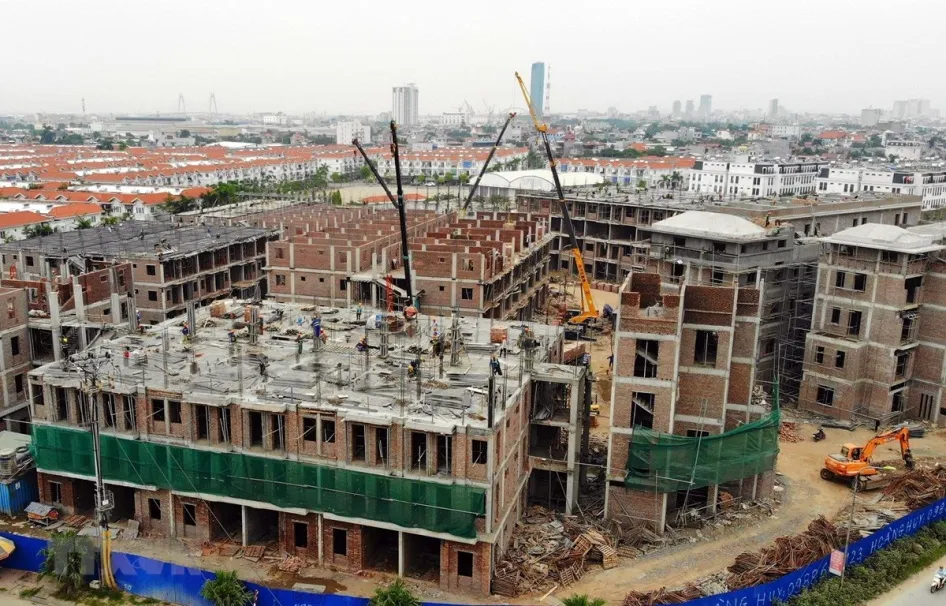
He pointed out that the slow execution of the VND 120,000 billion credit package intended for social housing projects is due to significant limitations and a substantial lag in policy formulation. These factors have the potential to undermine the effectiveness of the policy.
JOURNALIST: - Could you elaborate further on the policy limitations and delays?
Assoc. Dr. NGÔ TRÍ LONG: - The loan conditions are burdened with issues across three key aspects. Firstly, there's the need to fulfill financial obligations. Secondly, enterprises (including businesses and investors) are required to settle their land use fees (which is a challenging step for most businesses). Lastly, obtaining a building permit is mandatory. While this condition primarily aims to ensure the bank's security and minimize the risk of bad debts, businesses are currently grappling with numerous difficulties due to prevailing market conditions.
Regarding the policy delay, the interest rates for this package are 8.7% annually for investors and 8.2% annually for individuals purchasing homes. These rates were appropriate at a time when interest rates were considerably higher. However, the State Bank has since reduced interest rates on four occasions, with the possibility of further reductions in the near future. Consequently, the interest rates are no longer suitable given the current economic context.
- Sir, the Ho Chi Minh City Real Estate Association (HoREA) recently suggested that the Government consider lowering the interest rates for this package. What is your perspective on this matter?
- In reality, funding sources for the real estate market are diverse, with banks and bond issuance being the two most significant channels. The bond market, however, is experiencing a standstill. The relationship between the banking sector and businesses is symbiotic, with both mutually supporting each other for shared growth. For banks, holding a substantial amount of capital and not allowing it to generate returns will hinder the desired sustainable impact. Conversely, real estate projects require substantial capital, as each endeavor involves significant investment. The real estate sector is a top priority for the banking industry, as lending to this sector can be highly profitable, albeit with heightened risks. Thus, reviving the real estate market would also benefit banks.
On the other hand, commercial banks operate as businesses and must adhere to safety criteria to avoid bad debts. Lending recklessly to inefficient or unviable enterprises poses significant risks. Nevertheless, given the symbiotic relationship between banks and businesses, the current interest rates for the VND 120,000 billion package remain elevated. While various stakeholders are currently engaged in finding solutions to address the challenges faced by the real estate market, stimulate market supply, and address housing needs, the relatively high interest rates remain an impediment. Moreover, from the supply perspective, social housing projects are not highly profitable for businesses. This is an important consideration in policy design. On the demand side, potential homebuyers, particularly those subject to social policies, may struggle to afford such interest rates.
Providing loans to real estate businesses stimulates supply while extending loans to homebuyers stimulates demand. In the present circumstances, it is crucial to analyze the imbalance between supply and demand. If there's a shortage of supply, the focus should be on strengthening the supply side. Conversely, if there's an excess of supply and insufficient demand, the focus must shift to stimulating demand. Just like in medicine, accurate diagnosis is essential for effective treatment. A support package cannot simultaneously stimulate both supply and demand.
- So, would it be accurate to say that the feasibility of this lending package is low?
- During a meeting with business representatives, it became evident that the concern lies not with the policy itself, but with its implementation. This discrepancy arises from the fact that the proposed policy lacks feasibility and does not align with practical realities. While the policy proposal might seem excellent, its actual feasibility is quite limited. Consequently, bringing such a policy to fruition becomes challenging.
In comparison to the earlier VND 40,000 billion package with a 2% interest rate subsidy, the State Bank's announcement of the VND 120,000 billion interest rate support package was initiated by the banks themselves. Thus, in times of difficulty, a "harmonious benefits, shared risks" approach is appropriate. When businesses encounter challenges, banks must share the burden, as businesses require financing to operate, generate output, and ultimately benefit both parties. Establishing conditions that seem unrealistic would create challenges for both sides.
I'd liken the current state of the real estate market to standing on the precipice. Delays in implementing support policies could have dire consequences, potentially leading to business closures and significant fallout. Therefore, given the pressing circumstances, it is essential to first identify the appropriate beneficiaries and design a reasonable strategy, followed by timely implementation. Policy design should prioritize high feasibility.
In terms of beneficiaries, it's crucial to determine whether support should be directed toward the demand side or the supply side, at what interest rates, and for which types of housing. Whether the support is extended to social housing or expanded to include commercial properties, such as affordable or mid-range homes, townhouses, or apartments, must be carefully considered. Currently, the market is in need of rescue, and a well-designed policy will play a pivotal role in reviving the real estate sector.
- Thank you very much.




















